Over the past one hundred years IUPAC has broadened its activities beyond a focus on the creation of a common language for chemistry. One of its core values is to encourage and support collaboration and communication among all its stakeholders and as a result IUPAC has developed a diverse portfolio of essential tools for the global application and communication of chemical knowledge. This collaboration is accomplished through the IUPAC Project system and this IUPAC Story is one of many examples of how successful and effective the Project system has become.
This IUPAC Story is about the book series, Successful Drug Discoveries, that resulted from IUPAC Project 2013-016-1-700. It is in the words of the Project chair, Dr. János Fischer (JF), currently an Associate Member of IUPAC Division VII, Chemistry and human Health, as noted in an interview by Ms. Zsuzanna Ferencz (ZF), Head of Library and Information Services at Gedeon Richter Plc where Dr. Fischer is research advisor. Read on and see how IUPAC supports an active global research network in their development of essential information resources. In Dr. Fischer’s own words “… my membership in IUPAC, and the personal contacts that came with it, played a big role in compiling all the volumes.” Thanks are due to Krisztina Rozsnyai for the English translation.
Any chemist or group of chemists from around the globe can submit a project proposal – they do not have to be part of an IUPAC Body. Proposals are reviewed in details and, if approved, funding is provided to the Project task group. Project deliverables can include traditional standardization of nomenclature and terminology, glossaries in specific fields, data standards, etc. The system facilitates a speedy resolution of problems while engaging the active participation of chemists worldwide who volunteer their time and expertise to address the problems of greatest importance that fall within IUPAC’s scope; i.e., they address at least one of the goals listed in the IUPAC Strategic Plan and satisfy a least one of the following criteria: (a) the proposals should be related to the needs of chemists around the world, not just those in a specific country or region; (b) they should be related to the role of chemistry for the needs of mankind; or (c) they should be best tackled by an international team. For more information on the IUPAC Project System, see <iupac.org/what-we-do/projects/>.




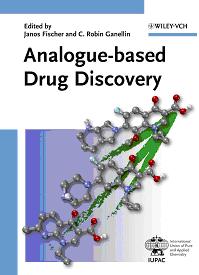 (JF) Three factors gave me the impetus for coming out with the series Successful Drug Discovery (SDD). One was the three-volume
(JF) Three factors gave me the impetus for coming out with the series Successful Drug Discovery (SDD). One was the three-volume 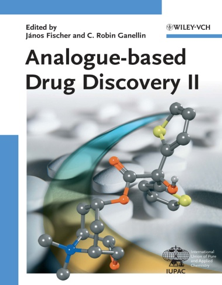 (JF) I edited the first two volumes of Analogue-based Drug Discovery (ABDD) with the famous British drug researcher, Robin Ganellin, and for the third volume David Rotella from the U.S. joined the editorial board. Volume 1 of the ABDD comprises three parts and twenty-three chapters. (DOI:
(JF) I edited the first two volumes of Analogue-based Drug Discovery (ABDD) with the famous British drug researcher, Robin Ganellin, and for the third volume David Rotella from the U.S. joined the editorial board. Volume 1 of the ABDD comprises three parts and twenty-three chapters. (DOI: 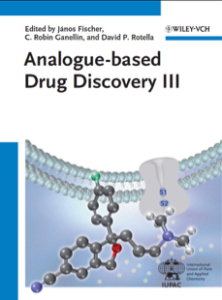 The work of thirty to forty authors needs to be coordinated for each volume. Of course I was in mail contact with the authors as well as the reviewers of each chapter, deciding on the latter being part of the editor’s job. The book introduced all contributors of the chapters with their photos and CVs. The series lays great emphasis on the significance of the personality.
The work of thirty to forty authors needs to be coordinated for each volume. Of course I was in mail contact with the authors as well as the reviewers of each chapter, deciding on the latter being part of the editor’s job. The book introduced all contributors of the chapters with their photos and CVs. The series lays great emphasis on the significance of the personality.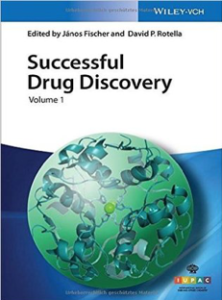
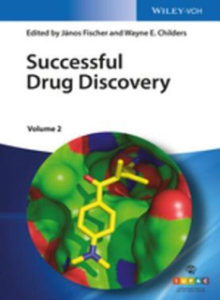 (JF) I finished my work at Richter as head of a research laboratory in 2006 and in the ten years since then six books have been published, three of them under the title Analogue-based Drug Discovery and three within the new series called Successful Drug Discovery, which comes to an average of one volume every two years. With the new series we were able to shorten the time from start to finish to a year. The first volume came out in 2015, the second one in 2016 and the third appeared in April of 2018 due to some unforeseen and unavoidable delays for the publisher.
(JF) I finished my work at Richter as head of a research laboratory in 2006 and in the ten years since then six books have been published, three of them under the title Analogue-based Drug Discovery and three within the new series called Successful Drug Discovery, which comes to an average of one volume every two years. With the new series we were able to shorten the time from start to finish to a year. The first volume came out in 2015, the second one in 2016 and the third appeared in April of 2018 due to some unforeseen and unavoidable delays for the publisher.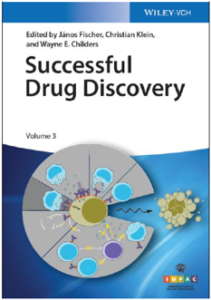 (JF) I was at a conference in Switzerland, in Bürgenstock, in 2004 or 2005. As a guest of Andrea Vasella, a professor in Zurich, I met the editor in chief of Helvetica Chimica Acta, a Turkish gentleman named Kisakürek. I mentioned the planned IUPAC project and book to him. At this conference, there was a colleague from Germany who brought to my attention the German unit of the U.S. publisher Wiley and I got into contact with its director, Eva Wille. I remember liking the Wiley offer better, although I don’t recall the exact details after all these years. I initially agreed with the publisher that I would decline my editor’s fee for the IUPAC’s benefit. I considered this appropriate since IUPAC supports the book project and this way, I am able to reimburse the costs of the project meetings.
(JF) I was at a conference in Switzerland, in Bürgenstock, in 2004 or 2005. As a guest of Andrea Vasella, a professor in Zurich, I met the editor in chief of Helvetica Chimica Acta, a Turkish gentleman named Kisakürek. I mentioned the planned IUPAC project and book to him. At this conference, there was a colleague from Germany who brought to my attention the German unit of the U.S. publisher Wiley and I got into contact with its director, Eva Wille. I remember liking the Wiley offer better, although I don’t recall the exact details after all these years. I initially agreed with the publisher that I would decline my editor’s fee for the IUPAC’s benefit. I considered this appropriate since IUPAC supports the book project and this way, I am able to reimburse the costs of the project meetings.